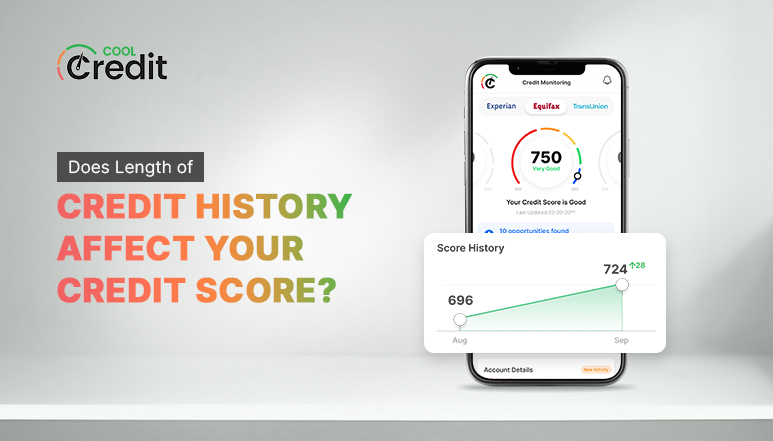
Does Length of Credit History Affect Your Credit Score?
Credit history makes up 15% of your credit score calculation, needless to say, it significantly impacts your scores. The length of the credit history is an important factor, as the longer it is, the more favorable it is for you. Ideally, a 7-year-long credit history is considered good. It provides enough evidence of responsible credit management, which can help boost your creditworthiness.
In this blog, we’ll answer “what is a good length of credit history” and why it matters.
What Do Lenders Consider When Reviewing Your Credit History?
The lenders evaluate several key factors to determine, “Does this person demonstrate responsible repayment habits?" including:
- Types of credit accounts (i.e., credit card, mortgage, personal loan, etc.)
- The amount of total debt owed vs. how much of the available credit limit is being used (aka, your credit utilization ratio)
- Any recent hard credit inquiries (as too many credit applications can raise concerns)
- Any records of previous bankruptcy or significant financial distress in the person's history
- Your credit behavior over time (Pro Tip: Consistently making timely payments and maintaining a low debt utilization rate can play in your favor.)
- Any recent changes in credit patterns (For instance, a sudden increase in credit utilization or applying for multiple lines of credit in a short period)
And most importantly,
- The number of years the person has used credit (i.e., the length of credit history, including the oldest accounts).
Automate Your Credit Repair with AI. Take the First Step to Financial Freedom!
Get StartedWhat Is the Length of Credit History?
It refers to how long you've had your credit accounts open. For instance, if your first credit card was opened on a specific date and you’ve been using it ever since, that date marks the beginning of your credit history (assuming before that you didn’t have any loans or other lines of credit). The time from that first account to today represents the length of your credit history. Similarly, the length of credit history of all your other open credit accounts will be considered.
These accounts include:
- Credit cards
- Auto loans
- Mortgage
- Personal loans
- Any other line of credit
So, in simple terms, the length of credit history = the duration over which you’ve been handling debt.
How Is Length of Credit History Calculated?
Each of your credit accounts has a specific opening date. Hence, credit bureaus calculate the length of each of your accounts. For ongoing credit lines, the length to date is considered. Based on the age of all your accounts, the average credit length is calculated.
Here’s an example:
Let’s say your credit card is your oldest account with 10 years of credit history. You also have a personal loan from the last 3 years and another credit account with 5 years of credit length. So, the average credit length would be 6 years, i.e., 10+3+5 (the sum of all the account ages) divided by 3 (the number of accounts).
The “age of a credit account” is calculated based on how long it has been open. For instance, if you obtained a line of credit in 2018, which you closed after four years in 2022. So after being closed for another two years, the account will only be counted as 4 years old, not as 6 years.
Length of Credit History vs. Credit Age: How Are They Different?
The two are often used interchangeably, though they have distinct meanings. The length of credit is how long the credit accounts on your report have been open. It typically depicts the length of time each of your accounts has been active, from your very first credit account to your recent ones. Whereas credit age refers to the “average age” of all your accounts on your credit report.
A longer credit length is considered a positive factor that helps demonstrate your trustworthiness to lenders. On the other hand, a high credit age suggests stability in managing multiple accounts. Both factors contribute to a stronger credit profile in different ways.
To understand it simply, let’s say you have 2 credit accounts: a mortgage started 10 years ago and a personal loan taken 5 years ago. Based on this, the age of your oldest account is considered to be 10 years (your length of credit history), whereas the average age of all your accounts (credit age) comes out to be 7.5 years.
How the Length of Credit History Can Impact Your Credit Score
When credit bureaus evaluate your credit score, they consider 5 main factors, including Payment History (35%), Credit Utilization Rate (30%), Length of Credit History (15%), Credit Mix (10%), and Recent/Newest Credit Lines (10%), if any.
When reviewing your credit history, the two main factors that credit bureaus consider are the age of your oldest account and the credit age of your accounts. The longer your credit history, the better your credit score, as long as you display responsible credit behavior. However, if you have a short credit history or have gaps in between, you may have a more challenging time getting credit approval.
Fix Your Credit On-the-Go! Download Our App and Start Repairing Today!
Get the AppWhat Is a Good Length of Credit History?
Different bureaus may use different scoring models. i.e., FICO, VantageScore, etc., so the scores can vary. However, generally, the length of credit history from 7 years up to 10 years is considered the most ideal.
| Timeline | Phases | What It Means |
| 1–3 Years | Starting Point | You're new to credit and still in the process of building your history and establishing your credit profile. |
| 3–5 Years | Gaining Ground | Your credit history is developing; though it’s not extensive, you're gaining the experience necessary to demonstrate responsible use. |
| 5–7 Years | Good | You’ve built a solid length of credit history that is considered good and generally acceptable by most lenders. |
| 7–10 Years | Excellent | You’ve built an extensive credit history. This long-term record is viewed as an excellent indicator of your reliability and strong creditworthiness. |
How to Increase the Length of Your Credit History?
Improving the length of credit history takes time and consistent effort. Here are some effective strategies to consider to boost and maintain a strong credit history:
- Keep Old Accounts Active for Longer
The longer your accounts remain open, the more positively they impact your credit report. Keeping old accounts open for an extended time can help increase the average age of your credit accounts.
- Avoid Cancelling Credit Cards
Timely paying credit card bills is a great way to maintain a favorable credit score. But of course, how closing a credit card affects your length of credit history wouldn’t be the first thought that comes to mind. But keeping it active, especially credit cards without annual fees can help lengthen your credit history.
- Always Make On-Time Payments
When assessing your credit history, your payment history is also viewed to determine whether you display responsible credit behavior. Hence, while you strategically manage multiple credit accounts, it’s crucial to not miss any payment deadlines.
- The Sooner You Start, the Better
Many may consider only obtaining credit, such as a credit card when they need it. However, it can help to get a credit card issued, even if you don’t use it much or use it occasionally for smaller expenses. Doing so can help you build a long-term credit history without any crushing financial obligations.
- Use Your Credit Accounts Regularly
Keeping accounts open isn’t enough—you need to use them periodically to show active and responsible credit usage. Small, regular purchases that you repay in full can help keep the account active and demonstrate positive credit behavior.
- Apply for New Lines of Credit Strategically
Applying for various lines of credit within a short time frame or after a long gap can both reflect negatively on your credit report. Hence, it's best to apply for new credit lines at least 6 months or 1 year after obtaining the previous credit.
- Becoming an Authorised User
If someone you trust, like a family member (father or mother), has a credit card they've had for a long time and have used responsibly, they can add you as an authorized user on their account. This means you’ll be linked to their account, and their positive payment history can benefit your credit profile.
Building a strong credit history with a good length of credit age can take considerable time and consistent effort. It's best to stay patient, monitor your credit reports regularly, and be responsible with your money.
| Take Control of Your Credit Health—Try CoolCredit! You can use the DIY credit repair app, CoolCredit, to stay on top of your credit history. With CoolCredit, you can instantly fetch your credit reports from all three major bureaus—Equifax, Experian, and TransUnion. This AI-assisted credit repair app can help analyze your report, flag any negative items, and help you dispute errors with its ready-to-use dispute letter templates. Additionally, with its credit booster feature, you can fast-track your journey to building a good credit score. Download it for free to get started! |
Words of Caution: Top Mistakes That Could Hurt Your Length of Credit History
- Not paying your bills or paying them late
- Opening too many credit cards and not making timely payments
- Overspending and exhausting your credit limit driving high balances on your credit accounts
- Not maintaining your old accounts and keeping them inactive
- Applying for credit unnecessarily without much distance between credit accounts
- Not monitoring your credit reports regularly
- Maintaining a high credit limit on credit cards
- Co-signing a loan for someone with bad credit
These mistakes not only cost you credit points but also money, in addition to portraying you as financially irresponsible. Hence, make sure to follow the aforementioned tips to build a good credit history and minimize/manage your finances, as well as monitor your credit activity closely.
Conclusion
A good length of credit history is a key component of your credit report and overall financial health. Building and maintaining a long, positive credit history takes time, but the benefits are substantial. If you're just starting out or need to improve your credit history, there are clear steps you can take, from using credit responsibly to diversifying your accounts.
Start today, so your future self will thank you for the effort!
FAQs
Q: How Long Is a Good Credit History?
A: 5–7 years length of credit history is considered good, while a 7 to 10+ years long credit history is even more well-accepted and favored.
Q: How Closing a Credit Card Affects Your Length of Credit History?
A: It reduces your overall credit length. Here’s an example: If you close a credit card after 4 years, and get a new one after 3 years, the length of your credit history will be 4 years. It will not be considered as 7 years since the account was closed for 3 years.
Q: If I Cancel a Credit Card, Will It Hurt My Credit Score?
A: While it negatively impacts your credit history and credit utilization ratio, if you have paid off the balance before closing, it won’t knock down any points.





